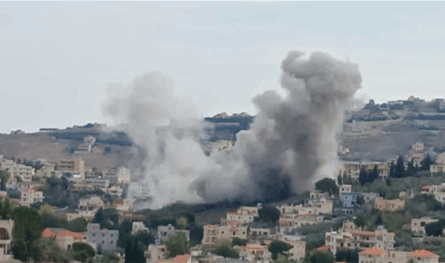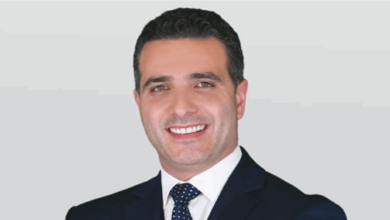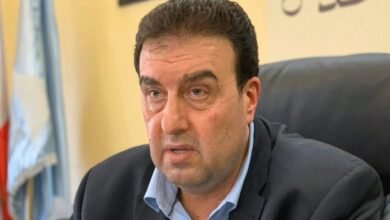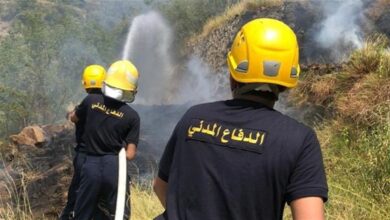The French and American mediations are renewed in light of the escalation to prevent all-out war


“An-Nahar” wrote: Yesterday, a violent picture of the mutual confrontations between Israel and Hezbollah was depicted, including concentrated attacks by the party on military targets that were painful for the Israelis, while Israeli drones penetrated into assassination operations, reaching a dangerous depth in the Western Bekaa, targeting leaders of the “Islamic Group.” In fact, it seemed difficult to isolate this escalation from its coincidence, on the eve of a new advanced attempt by French diplomacy aimed, in particular, at cooling Lebanon’s southern front with Israel through the new round that French Foreign Minister Stephane Ségournet is launching today from Beirut, which will lead him after Beirut to the Kingdom of Saudi Arabia and Israel. It is a round during which the outcome of the French plan presented to both Lebanon and Israel with the aim of restoring calm and stopping confrontations in the south is supposed to emerge on the basis of a proposed three-stage mechanism to restore commitment to implementing Resolution 1701.
The other striking factor emerged in what was revealed overnight that the US President’s chief advisor, Amos Hochstein, is in Israel. The information indicated that Hockstein spoke with Israeli officials regarding the path, which would lead to a diplomatic solution that would end the shooting across the Lebanese-Israeli border.
As for Sigourney, he seeks to calm the situation on the southern border and prevent it from exploding on a large scale, as Israel threatens, amid mounting French concern about this possibility, as French officials have begun to express openly and constantly. The pace of diplomatic contacts has recently witnessed a remarkable intensity to prevent any Israeli attack on Lebanon, amid the return of focus on the French initiative despite the large number of mediators and intermediaries in relation to the importance that France attaches to Lebanon, which was evident in Prime Minister Najib Mikati revealing aspects of his visit to Paris before the Council of Ministers, which was held. Yesterday’s session.
“Call of the Nation” wrote: French Foreign Minister Stephane Ségournet arrives in Beirut today. On the eve of his arrival, the French Foreign Ministry revealed that “there has been progress in the talks regarding Paris’s proposal to reduce the escalation between Lebanon and Israel.” The ministry said in a statement: “Our proposals to reduce the escalation between Lebanon and Israel reflect deep concern about the regional situation.”
“Al-Akhbar” wrote: Informed sources said that US President Joe Biden’s special envoy Amos Hochstein, who arrived in Tel Aviv yesterday, was reported to have presented a new proposal during his meeting with Israeli Defense Minister Yoav Galant to reach a diplomatic solution that would end the military escalation between Lebanon and Israel, the sources said. The American envoy “seeks to try to return everyone to the rules of engagement in light of the American conviction that calm will not be achieved in Lebanon before reaching a major agreement that includes Gaza.” Haaretz newspaper reported that “Washington has drawn lines to achieve the beginning of an agreement on a ceasefire and the liberation of the abductees in the Gaza Strip.” She added that the hypothesis is that “starting from the moment calm is achieved in the south (south of occupied Palestine), Hochstein will propose a solution, and calm will return to the north (on the border with Lebanon), at least for a time.”
“Al-Binaa” wrote: On the eve of the visits of the Foreign Minister of France, Stephane Ségournet, today, and of Bahrain, Abdul Latif bin Rashid Al-Zayani, next Sunday, diplomatic circles have pointed out, according to media sources, that the pace of communications has noticeably accelerated in recent days to prevent any Israeli attack on Lebanon, indicating that the French initiative The list has not changed, despite the large number of mediators and intermediaries in relation to the importance that France attaches to Lebanon, which may be translated into a visit by President Emmanuel Macron, speaking of slight progress in this context. She stressed that, at the same time, she was not neglecting the presidential file, but that the presidency had become part of the comprehensive political settlement in Lebanon.
However, an informed political source explained to Al-Binaa that “the international mediations revolve around one goal, which is ensuring the security of Israel, calming the northern front with Lebanon, and pressuring Hezbollah to stop its military operations, to ease the Israeli government’s impasse and ease the pressure on the Israeli army from the north to devote itself to The Gaza, Rafah and West Bank fronts,” noting that “the amended French proposal is a trap for Lebanon, that is, Israel wants to barter the cessation of its military operations against Lebanon in exchange for Hezbollah stopping its military operations against it, and it will be the winner in this offer because it gets rid of the impasse on the northern front.” It evades restoring Lebanon’s rights to its occupied land and the 13 points, and Lebanon loses the Southern Front’s card to pressure Western powers to restore its sovereign rights to its land and accelerate the extraction of oil and gas from Lebanese blocks. The source stressed that the Lebanese government will not exert any pressure on Hezbollah to impose enemy conditions on Lebanon that achieve the Israeli interest and ignore Lebanese rights.
Al-Liwaa wrote: A French diplomatic source was quoted as saying that the effort in Beirut and Tel Aviv aims to obtain a pledge from the two sides of the conflict, Israel and Hezbollah, not to violate Resolution 1701, to restore calm and stability to the borders between the Lebanese and Israeli sides.
In this context, information reported that the chief American mediator, Amos Hockstein, was holding talks in Tel Aviv in order to reach a diplomatic path to end the shooting across the border between Israel and Lebanon.
“Call of the Nation” wrote: French Foreign Minister Stephane Ségournet arrives in Beirut today. On the eve of his arrival, the French Foreign Ministry revealed that “there has been progress in the talks regarding Paris’s proposal to reduce the escalation between Lebanon and Israel.” The ministry said in a statement: “Our proposals to reduce the escalation between Lebanon and Israel reflect deep concern about the regional situation.”
Al-Diyar wrote: French Foreign Minister Stephane Ségourney arrives in Beirut today to discuss two points. The first point is the implementation of Resolution 1701 and the possibility of calming the southern front. The second point is the issue of electing a president in Lebanon, as France considers this matter to have become more than necessary. In this context, Sigourney will present a modified paper on the Hezbollah issue during his meeting with Lebanese officials. This is because France worked hard from the beginning to calm the situation in the south and made it clear that the “Israeli” war government had set two paths on how to confront Hezbollah. The first path is to adopt diplomacy as an option to push Hezbollah beyond the Litani River, through the movement of international envoys to Lebanon, most notably the French envoy. The second path is to wage war against Hezbollah to impose a diplomatic solution that obligates the latter to implement Resolution 1701 and retreat behind the Litani, and this is what France does not want to happen.
French Minister Sigourney comes to Lebanon to find out Hezbollah’s position on Resolution 1701. If “Israel” commits to implementing this resolution, withdrawing from the Shebaa Farms and the Kfar Shuba Hills, and implementing the full provisions of 1701, what will Hezbollah’s position be if that happens?
In this context, circles close to Hezbollah say that the latter will not give any answers to the French Foreign Minister or anyone before stopping the Israeli aggression on Gaza, and after that for every recent incident.
« Berlin police remove a sit-in camp near Parliament
[previous_post_link]






